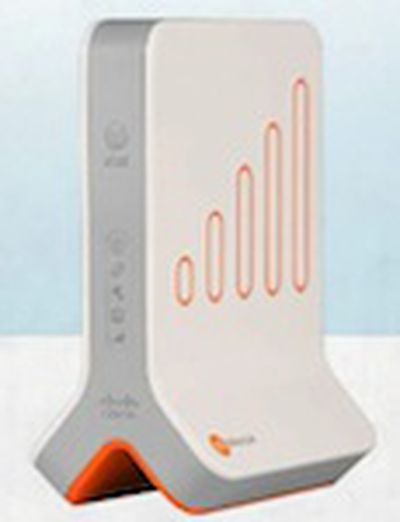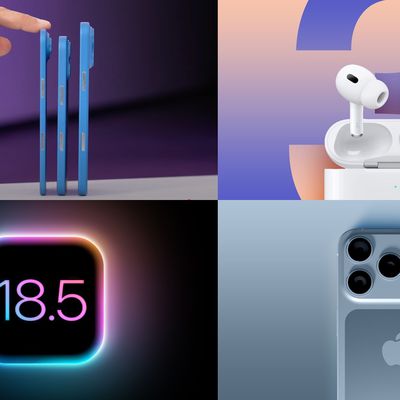AT&T Set to Roll Out Nationwide 3G MicroCell Availability Beginning Next Month

AT&T today announced that next month it will begin a nationwide rollout of its 3G MicroCell service that allows users to route their cellular phone calls around the house onto their broadband Internet connection as a solution for spotty cellular coverage. Supporting both voice and data services, the 3G MicroCell device carries a price tag of $149.99, although AT&T is offering rebates to users signing up for monthly MicroCell service plans to augment their existing cellular plans or switching to the company's DSL or U-Verse broadband service.
AT&T today announced that AT&T 3G MicroCell plans to begin its national roll out beginning in mid April, with new markets activating in cities across the continental U.S. for the next several months. AT&T 3G MicroCell is an innovative solution that allows residential customers to route wireless phone calls and data connections (or sessions) across a home broadband connection. This solution is designed to benefit customers who live in homes that have coverage impediments that consistently interrupt wireless spectrum, such as dense wall and roof construction or unfavorable terrain.
Customers have the option of using minutes from their normal cellular phone plan or signing up for a $19.99/month companion plan that allows unlimited calling over the customer's MicroCell without utilizing their cellular minute allotment.
AT&T's 3G MicroCell began service in the Charlotte, North Carolina region last September and has expanded to other test markets in recent months as the company has geared up for full nationwide availability. AT&T, currently the sole iPhone carrier in the U.S., has received a significant amount of criticism over its network performance, particularly in high-density areas such as New York City and San Francisco. The company has, however, seen improved performance in recent months putting it on par or ahead of other carriers in many major markets.
Popular Stories
While the iPhone 17 Pro and iPhone 17 Pro Max are not expected to launch until September, there are already plenty of rumors about the devices.
Below, we recap key changes rumored for the iPhone 17 Pro models as of April 2025:
Aluminum frame: iPhone 17 Pro models are rumored to have an aluminum frame, whereas the iPhone 15 Pro and iPhone 16 Pro models have a titanium frame, and the iPhone ...
While the so-called "iPhone 17 Air" is not expected to launch until September, there are already plenty of rumors about the ultra-thin device.
Overall, the iPhone 17 Air sounds like a mixed bag. While the device is expected to have an impressively thin and light design, rumors indicate it will have some compromises compared to iPhone 17 Pro models, including only a single rear camera, a...
This week marks the 10th anniversary of the Apple Watch, which launched on April 24, 2015. Yesterday, we recapped features rumored for the Apple Watch Series 11, but since 2015, the Apple Watch has also branched out into the Apple Watch Ultra and the Apple Watch SE, so we thought we'd take a look at what's next for those product lines, too.
2025 Apple Watch Ultra 3
Apple didn't update the...
If you missed the video showing dummy models of Apple's all-new super thin iPhone 17 Air that's expected later this year, Sonny Dickson this morning shared some further images of the device in close alignment with the other dummy models in the iPhone 17 lineup, indicating just how thin it is likely to be in comparison.
The iPhone 17 Air is expected to be around 5.5mm thick – with a thicker ...
Despite being more than two years old, Apple's AirPods Pro 2 still dominate the premium wireless‑earbud space, thanks to a potent mix of top‑tier audio, class‑leading noise cancellation, and Apple's habit of delivering major new features through software updates. With AirPods Pro 3 widely expected to arrive in 2025, prospective buyers now face a familiar dilemma: snap up the proven...
When an iPad running iPadOS 19 is connected to a Magic Keyboard, a macOS-like menu bar will appear on the screen, according to the leaker Majin Bu.
This change would further blur the lines between the iPad and the Mac. Bloomberg's Mark Gurman previously claimed that iPadOS 19 will be "more like macOS," with unspecified improvements to productivity, multitasking, and app window management,...
Starting today, April 24, Apple Stores around the world are giving away a special pin for free to customers who request one, while supplies last.
Photo Credit: Filip Chudzinski
The enamel pin's design is inspired by the Global Close Your Rings Day award in the Activity app, which Apple Watch users can receive by closing all three Activity rings today. The limited-edition pin is the physical...
We've known for quite some time about Apple's plans for a thinner "iPhone 17 Air" coming later this year, but wow, the latest dummy models give us our best look yet at just how thin this phone is going to be.
Other Apple news and rumors this week included another iOS 18.5 beta, the 10th anniversary of the Apple Watch launch, and more management reshuffling in Apple's Siri division, so read...























